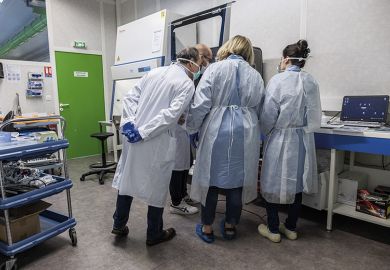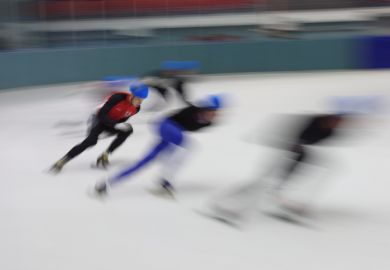I have seen a number of colleagues posting messages on social media about their struggles to do any research at all during the coronavirus lockdown, saying that they don’t feel like their research really matters very much in these extraordinary times.
Coupled with the postponement of the UK’s 2021 research excellence framework, I can understand why people may feel that their research lacks value right now, especially when they see colleagues making superhuman efforts to fight the coronavirus. I work in a school alongside some extraordinary scientists, who have rapidly made their lab skills available to the cause. We have even shipped off equipment to hospitals and our Maker Space is 3D printing personal protective equipment for use in hospitals by front line workers.
Yet, what strikes me most about these activities, and other work we do in universities, is just how much of what we call research is a collaborative effort. We can become so obsessed with whether we have the right papers out there, or the sufficient type of funding, or the necessary impact, but everything we do has far more value than these indicators reveal.
We are not simply individual researchers chipping away at our own pursuits in isolation. Rather, we are a community with the skills and knowledge that lead us to value and champion really important things within society, such as the importance of evidence, the value of critically questioning facts and claims to knowledge, or the need for reflection and measured ways of working.
As literary critic Edward Said said of the public intellectual, we are people who “speak truth to power”, who hold individuals and institutions to account – and we all enjoy these skills regardless of the specific research we practice.
One outcome of our interconnectedness that contributes to the fight against the virus is the recently launched Coronavirus Tech handbook, a vast undertaking assembled by scholars from medicine, science, media and technology.
Recognising that being a researcher involves much more than just writing our own papers is also a crucial step towards valuing what we do as researchers. We are communicators, storytellers, teachers, peer reviewers and support systems for others.
If you turn your research expertise to helping other academics get their own papers out, then that’s already a massive contribution over this period – and it is born from your research knowledge.
And if you really feel that your specific area of research has less value in these times, then I would urge you to take the long view on what societies need. My own research has spanned science, art, media, culture, sport, technology and law. What I’ve learned by collaborating with colleagues across so many disciplines is that the best research is done by people who know and appreciate that our knowledge is still a work in progress. The value we attach to knowledge is often not found in a specific moment in time, but can accumulate over centuries.
There are many things you can do to stem the feeling of impotence over this period. Many academics are already creating podcasts, video lectures, writing articles for online platforms, delivering classes for kids, creating supportive networks for their students, or sharing their research more widely through social media.
All of these things have value and have the potential to enrich people’s lives. Never has there been as great a time as now for researchers to be publicly engaged, to function as knowledge communicators, and to be present and visible. It’s also not a bad idea to use this time to catch up on all the reading you’ve wished you could do for months or to discover new digital platforms to streamline your research workflow. Set up profiles on those new academic network platforms you’ve never had time to explore.
The coronavirus has given us a huge opportunity to champion the importance of scholarly research and it is crucial that every researcher keeps on with their work. Of course, it’s also OK to give yourself a break from research for some time and focus on your personal or family needs. It’s absolutely right to reflect on the value of our research and this should be a continuous part of the research process, not done just when the world is in crisis.
Indeed, remaining agile as a researcher is important and can ensure you bring your advanced research skills to new contexts. This is a critical part of what it is to be a dynamic and valuable academic researcher.
So, make use of this time to reflect on your research, to make it more critically valuable, to realise its utility and to communicate it effectively to the public – but don’t give up.
Andy Miah is chair in science communication and future media in the School of Science, Engineering and Environment at the University of Salford.
Register to continue
Why register?
- Registration is free and only takes a moment
- Once registered, you can read 3 articles a month
- Sign up for our newsletter
Subscribe
Or subscribe for unlimited access to:
- Unlimited access to news, views, insights & reviews
- Digital editions
- Digital access to THE’s university and college rankings analysis
Already registered or a current subscriber?








